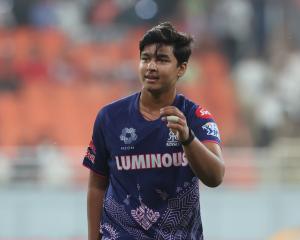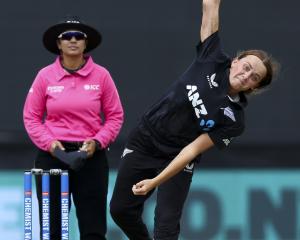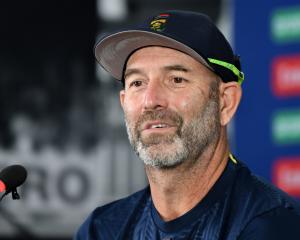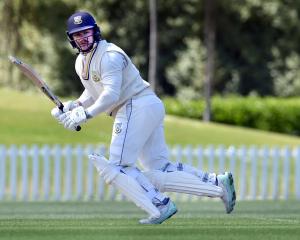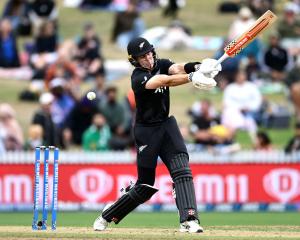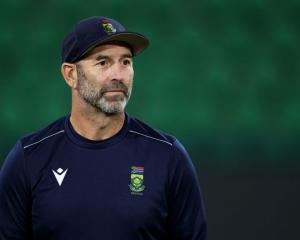Barry Milburn is generally regarded as one of the finest wicketkeepers to have played in New Zealand, but he played much of his career in the shadow of more accomplished wicketkeeper-batsmen. Ironically, writes Brent Edwards, Milburn will be remembered by many for the only century he made for Otago.

There are four strong possibilities:
1. As one of the unluckiest cricketers of his era.
2. As a player who made wicketkeeping an art form.
3. As a consummate team-man, who put his own needs behind those of his team-mates.
4. As the scorer of one of the most unlikely, and emotional centuries, in the history of the game in Otago.
The statistics do not do justice to Milburn's career, which began in 1964 and ended almost 20 years later.
He was unfortunate, not just with injuries but because his career coincided with those of Warren Lees, for Otago, and the late Ken Wadsworth, for New Zealand.
And he was unfortunate because he emerged in the first-class game when the mindset was changing from selecting specialist wicketkeepers to preferring wicketkeeper-batsmen.
There is an argument, to which many will subscribe, that Milburn, at his best, was at least the equal of any New Zealand gloveman.
He took immense pride in his work. He loved keeping and transmitted his enthusiasm to his team-mates. He hated making mistakes.
He was neat and tidy in his habits and that was reflected in his glovework.
He was an integral member of the Otago team which won the Plunket Shield in 1969-70 and 1971-72.
Whether it was to the express pace of Murray Webb, the swing of Bryan Andrews or the spin of the Alabaster brothers, Jack and Gren, Milburn's work behind the stumps was always accomplished and often brilliant.
Milburn's only test series was against the West Indies in 1969.
Garry Sobers was his first wicketkeeping victim in his debut at Eden Park and he was part of a six-wicket win - test victories were rare in those days - in the second test at the Basin Reserve.
The third test in Christchurch and the series were drawn and, remarkably, that was the extent of his test career.
He toured England, India and Pakistan later that year but, because of niggling injuries and the promise of runs from Wadsworth - who was to die of cancer in 1976 - he did not play in a test.
But he did have two claims to fame on tour.
He top-scored from No 11 with 17 not out when New Zealand played Essex and he earned the gratitude and admiration of his team-mates for his selfless attitude.
There were many empty days for Milburn but he determined that, if he could not be in the middle himself, he would lighten the load for those who were.
His contribution was especially important in India and Pakistan, where illness was invariably a factor.
Milburn missed six seasons of first-class cricket in the 1970s as Lees captained Otago, and his performances were restricted to playing for his club,
Taieri - he ran a butcher shop in Mosgiel - and Otago B.
But when Lees was in Australia with the New Zealand team in 1980-81, Milburn was recalled and made a triumphant return in the opening game against Wellington in Alexandra.
Milburn was 37, which was about the average temperature at Molyneux Park in those days, and 20 minutes before stumps he came in as nightwatchman when Otago lost its first wicket.
Now Milburn was a more than competent batsman but it had not translated into big scores. His best had been 36.
As the field closed in, Milburn resembled a first-day schoolboy being tormented by the class bullies.
He was so far forward in his eagerness to get over the ball that he seemed in danger of falling flat on his face.
But he survived until the close and the next day he scored what I still consider to be the most tenacious century made by any Otago batsman.
The heat was intense, Milburn was well past the first flush of youth but his score mounted during the morning session mainly through nudges, pushes and the occasional deflection.
He made it through to lunch, some feat in itself for someone not used to batting for long periods.
He sat quietly, his face scarlet with exertion, fearful his spell of deep concentration might be broken.
It became even hotter in the afternoon but the diminutive figure beneath the dark blue baggy cap became more assertive as he cut, drove and played his favourite pull shot through mid-wicket.
There was a heart-in-the-mouth moment on 91 when his concentration lapsed but, remarkably, the fieldsman at mid-off dropped a dolly catch.
All Otago, it seemed, heaved a sigh of relief.
That was the last false shot.
When the century eventually came - from a deflection to fine leg for three - the crowd rose to Milburn.
He was out soon after for 103 and, as he walked back to the pavilion - almost limp with exhaustion - the crowd gave him another standing ovation.
It was the only time in his first-class career that he passed 50.
The details of the remainder of the game remain a blur. To everyone who watched or listened, this was Milly's match.
Milburn captained Otago in 1982-83 and quickly established a rapport with his players.
Otago was no world-beater (it finished third in the competition) but it was no surprise that it was a happy team, on and off the field.
One of his most engaging qualities was the genuine pleasure he took from the success of others.
There was never a hint of sourness, no matter how unfairly it seemed that he might have been treated.
Another was the loyalty he showed to the Taieri club.
He played 102 senior matches and scored 3305 runs (average 23.61) with 99 the highest of his 15 half-centuries.
Barry Douglas Milburn
Born: Dunedin, November 24, 1943.
First-class career: 1963-64 to 1982-83.
Tests: New Zealand, Three, 8 runs, average 8; six catches, two stumpings.
First-class: Overall, 75 matches, 737 runs (average 11.51); 176 catches, 19 stumpings; Otago, 60 matches, 697 runs (average 11.42), 148 catches, 17 stumpings.
Milburn played 11 matches for New Zealand on the tour of England, India and Pakistan in 1969.


